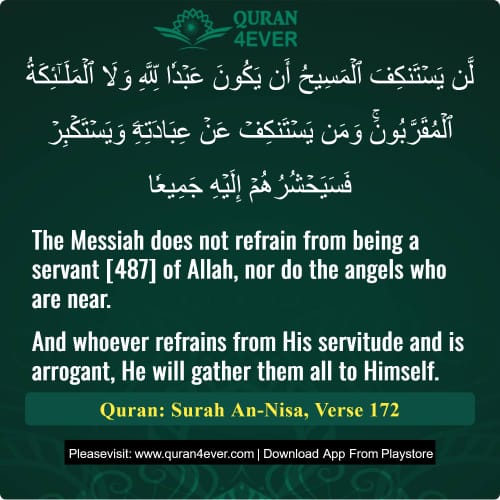
Transliteration:( Lay yastankifal Maseehu ai yakoona 'abdal lillaahi wa lal malaaa'ikatul muqarraboon; wa mai yastankif 'an ibaadatihee wa yastakbir fasa yahshuruhum ilaihi jamee'aa )
"The Messiah does not refrain from being a servant of Allah, nor do the angels who are near. And whoever refrains from His servitude and is arrogant, He will gather them all to Himself."
This verse was revealed when the Christians of Najran told the Holy Prophet ﷺ that calling Hazrat Isa (عليه السلام) the servant of Allah was an insult.
In response, the verse clarified that being Allah’s servant is not a flaw but a mark of honor.
From this, we learn that although all humans are servants of Allah, the Prophets are the most exalted servants. Through their sincere servitude, Allah’s divinity and majesty are reflected. Just as all subjects in a kingdom serve the king, some hold stately ranks like ministers—likewise, the Prophets hold high status in the servitude of Allah.
Even Allah Almighty takes pride in this servitude, as reflected in the verse:
"It is He who has sent His Messenger..." (Surah As-Saff 61:9)
From this we learn that boasting about worship and obedience is meaningless.
Pride in religious acts, especially rejecting servitude to Allah, is a sinful behavior. Such an error can never be committed by any Prophet.
The Christians (Nasara) falsely accused Hazrat Isa (عليه السلام) of declaring himself to be God’s son, which by implication meant denying servitude to Allah.
This verse serves as a refutation: Messiah himself does not disdain being Allah’s servant, nor do even the nearest angels. Thus, true honor lies in humble obedience, not arrogant self-elevation.
172. Al-Masih will never be too proud to be a servant of Allah, nor the angels who are the near (to Allah). And whosoever rejects His worship and is proud, then He will gather them all together unto Himself. 173. So, as for those who believed and did deeds of righteousness, He will give them their (due) rewards and more out of His bounty. But as for those who refused His worship and were proud, He will punish them with a painful torment. And they will not find for themselves besides Allah any protector or helper.
Ibn Abi Hatim recorded that Ibn `Abbas said that, `proud’, means insolent. Qatadah said that,
(Al-Masih will never be too proud to be a servant of Allah nor the angels who are near (to Allah).) ﴿they﴾ will never be arrogant, Allah then said,
(And whosoever rejects His worship and is proud, then He will gather them all together unto Himself.) on the Day of Resurrection. Then, Allah will judge between them with His just judgment that is never unjust or wrong.
(So, as for those who believed and did deeds of righteousness, He will give their (due) rewards, and more out of His bounty.) Allah will award them their full rewards for their righteous actions and will give them more of His bounty, kindness, ample mercy and favor.
(But as for those who refused His worship and were proud, ) out of arrogance, they refused to obey and worship Him,
(He will punish them with a painful torment. And they will not find for themselves besides Allah any protector or helper.) In another Ayah, Allah said,
(Verily! Those who scorn My worship, they will surely enter Hell in humiliation,) degradation, disgrace and dishonor, for they were arrogant and rebellious.
(4:172) The Messiah neither did disdain to be a servant of Allah nor do the angels who are stationed near to Him; and whoever disdains to serve Him, and waxes arrogant, Allah will certainly muster them all to Him.
There is no commentary by Abul Maududi available for this verse.

For a faster and smoother experience,
install our mobile app now.
Related Ayat(Verses)/Topics